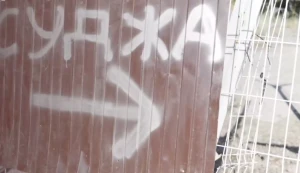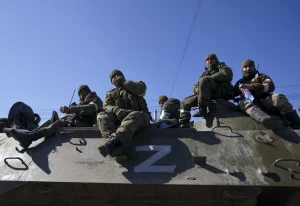
Russia’s Doppelgänger disinformation campaign linked to defense ministry
The German nonprofit organization Correctiv has uncovered new details about Russia's "Doppelgänger" campaign, a government-backed disinformation effort aimed at discrediting Ukraine and its allies
Insight News Media reported the information.
According to the outlet, the Kremlin campaign used fake social media accounts and news sites to spread disinformation to American and European audiences, focusing on election topics in the U.S. and EU.
Correctiv uncovered connections between the "Doppelgänger" disinformation campaign and Russia's defense ministry.
By tracing an IP address to a worker in the defense ministry’s Main Communications Directorate, Correctiv linked the campaign to Voentelecom, a Russian telecom provider with military ties.
In September 2024, the U.S. Justice Department dismantled several Russian disinformation websites, seizing 32 domains used to spread Kremlin propaganda, including content targeting the U.S. presidential election. Correctiv reported that Doppelgänger had used a German company to register new domains for its operations.
Russia’s "Doppelgänger" campaign sought to undermine support for Ukraine
The "Doppelgänger" campaign, orchestrated by Sergei Kiriyenko, Russia's First Deputy Chief of Staff and a close confidant of Putin, along with other members of the Putin administration, employed tactics such as cybersquatting, AI-generated content, and fake social media profiles to spread pro-Russian narratives, undermine support for Ukraine, and exacerbate social divisions in Western democracies. Investigations have traced the campaign to Vadim Lukyanchenko, a staffer in the Russian defense ministry, through documents linking him to the ministry's Main Communications Directorate.
Role of Russian military intelligence's psyop unit
The "Doppelgänger" campaign spread false reports and impersonated credible media outlets to deceive audiences, frequently using fake comments from celebrities to criticize Western aid to Ukraine. It also promoted divisive, antisemitic content targeting EU and U.S. audiences.
The operation's advanced technological infrastructure indicated likely significant state investment, underscoring its complexity. Connections to banned organizations like Rostec and GRU Unit 54777 reveal its likely alignment with Russia's broader hybrid warfare strategy.
This campaign has showcased Russia’s ability to influence public opinion, erode trust in democratic institutions, and destabilize Western societies through disinformation on social media and cloned websites.
Babakov Leaks shed light on Russia’s hybrid warfare abroad
In 2023, Ukrainian hacktivists leaked emails from Alexander Babakov, a key Russian politician, shedding light on his role in Russian hybrid influence operations. Babakov, a close ally of Vladimir Putin, was found to be heavily involved in disinformation and sanction evasion efforts.
The leaked correspondence revealed how the Kremlin established puppet media outlets in foreign countries, deployed experts and lobbyists, and used social media bots to spread pro-Russian narratives. These actions were part of a broader strategy to manipulate Western public opinion, a tactic Russia has honed over years of propaganda and disinformation campaigns through state-controlled media and local sympathizer platforms.
Russia’s "Doppelgänger" campaign tactics
The Kremlin’s “Doppelgänger” campaign aimed to spread pro-Russian narratives and undermine Western support for Ukraine. This effort involved creating at least 60 fake news websites designed to mimic reputable Western media outlets like Reuters, Fox News, Bild, Der Spiegel, and The Washington Post. According to court documents from the FBI's investigation in the Eastern District of Pennsylvania, Russian officials and tech companies played a central role in this disinformation operation, targeting the U.S. and European countries.
Sergei Kiriyenko was a key figure in orchestrating the "Doppelgänger" disinformation campaign, according to an FBI report. He was among the high-ranking officials involved in the operation aimed at spreading pro-Russian narratives and weakening Western support for Ukraine.
Entities under Sergei Kiriyenko's control, including ANO Dialogue, Structure National Technology (Structura), and the Agency of Social Design (ASD), have been central to the ongoing "Doppelgänger" disinformation campaign since at least May 2022. ASD, led by Russian political strategist Ilya Gambashidze, who is sanctioned by the West, has been exposed as a key tool in Russia's disinformation efforts.
The Agency of Social Design (ASD), a key player in Russia's disinformation efforts, focused on monitoring, analyzing, and creating content targeted at Western audiences. ASD tracked over 1,000 influential figures in pro- and anti-Russian circles, analyzing articles and social media in six languages to identify opportunities for disinformation.
The agency also aimed to influence the 2024 European Parliamentary elections by backing right-wing parties likely to promote pro-Russian views. The leaked documents revealed the operation’s scale and sophistication, showing how fake websites, featuring articles with real journalists' bylines, were used to spread disinformation through social media bots that targeted specific demographics in real time.
"Doppelgänger" campaign goals
The "Doppelgänger" campaign went much beyond mere news manipulation, as evidenced by the court filings. Multiple goals and objectives were part of the operation, according to court documents:
- Influence the outcome of U.S. elections;
- Force Western nations to reduce support for Ukraine;
- Demonize the current Ukrainian government;
- Incite hostilities between nations;
- Sway public opinion and impact elections overseas;
- Utilize politicians sympathetic to the Kremlin to advocate for policies.
The "Doppelgänger" campaign employed tailored strategies targeting different regions, with specific narratives designed to create division and weaken unity in Europe, particularly against Russian aggression. Special focus was given to countries like the United Kingdom, Germany, France, and Italy, aiming to promote pro-Russian viewpoints and stoke discord within the European Union.
How to enhance efforts to counter Russian disinformation
According to Insight News Media, the Kremlin's "Doppelgänger" campaign aligns with its broader disinformation efforts to influence Western democracies. While penalties may disrupt Russia's tactics temporarily, its operations become more sophisticated. In the U.S., Russia uses "real U.S. voices" on social media to "launder" propaganda, especially during elections. In Europe, research uncovered pro-Russian websites spreading Kremlin-backed narratives, including RT content, in Germany, France, Switzerland, and Czechia.
Russia Today (RT), a state-controlled Russian news outlet, faces sanctions in the EU and the U.S. for spreading Kremlin-backed propaganda and supporting Putin’s war in Ukraine. Despite these measures, RT has adopted tactics such as cloning its websites and shifting to new domains to bypass restrictions and continue its disinformation efforts globally.
“The efforts in tracking and revealing the Kremlin’s information warfare can be enhanced with more rapid actions from Western decision-makers involving sanctions and wide public awareness campaigns about the disinformation risks emanating from Russia, enabling them to formulate a more comprehensive and effective response,” the outlet concludes.
- News













































